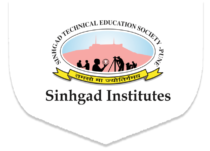ELECTRONICS AND TELECOMMUNICATION
POs & PSOs
PROGRAM OUTCOMES(POs)
Engineering Graduates will be able to –
1. Engineering knowledge: Apply the knowledge of mathematics, science, engineeringfundamentals, and an engineering specialization to the solution of complex engineering problems.
2. Problem analysis: Identify, formulate, review research literature, and analyze complexengineering problems reaching substantiated conclusions using first principles of mathematics,natural sciences, and engineering sciences.
3. Design/development of solutions: Design solutions for complex engineering problems anddesign system components or processes that meet the specified needs with appropriateconsideration for the public health and safety, and the cultural, societal, and environmentalconsiderations.
4. Conduct investigations of complex problems: Use research-based knowledge and researchmethods including design of experiments, analysis and interpretation of data, and synthesis of theinformation to provide valid conclusions.
5. Modern tool usage: Create, select, and apply appropriate techniques, resources, and modernengineering and IT tools including prediction and modeling to complex engineering activities with anunderstanding of the limitations.
6. The engineer and society: Apply reasoning informed by the contextual knowledge to assesssocietal, health, safety, legal and cultural issues and the consequent responsibilities relevant to theprofessional engineering practice.
7. Environment and sustainability: Understand the impact of the professional engineering solutionsin societal and environmental contexts, and demonstrate the knowledge of, and need forsustainable development.
8. Ethics: Apply ethical principles and commit to professional ethics and responsibilities and norms ofthe engineering practice.
9. Individual and team work: Function effectively as an individual, and as a member or leader indiverse teams, and in multidisciplinary settings.
10. Communication: Communicate effectively on complex engineering activities with the engineeringcommunity and with society at large, such as, being able to comprehend and write effective reportsand design documentation, make effective presentations, and give and receive clear instructions.
11. Project management and finance: Demonstrate knowledge and understanding of theengineering and management principles and apply these to one’s own work, as a member andleader in a team, to manage projects and in multidisciplinary environments.
12.Life-long learning: Recognize the need for, and have the preparation and ability to engage inindependent and life-long learning in the broadest context of technological change.
Program Specific Outcomes (PSOs)
Electronics & Telecommunication Engineering Graduates will be able to –
- Concepts:Understand Electronics & Telecommunication Engineeringconcepts through mathematics, analog, digital, signal processing, communication, computing, simulation, analysis and implementation.
- Methodology: Emphasize on creative design ideas, assignments and projects to solve problems in engineering and allied fields.
- Skills: Nurture holistic development and skills to pursue higher studies, employability and successfulentrepreneurship to cater need of masses and industries.
Program Educational Objectives (PEOs)
I. To sustain holistic development of students to pursue higher studies, successful entrepreneurship or cater needs of Indian and multinational industries, by providing excellent academic environment.
II. To develop students with solid foundation in mathematical, scientific and engineering fundamentals to solve engineering problems.
III. To nurture students with comprehensive knowledge and skills, to design & develop electronic systems for real life problems.
IV. To inculcate in students effective communication skills, teamwork skills, professional – ethical attitudes and cultivating ability in engineering issues through multidisciplinary domain to broader social context.
a) Short Term Goals
- To intensify industrial training to faculty and staff
- To motivate the faculty for qualification up-gradation
- To increase number of Memorandums of Understanding (MoU) with industries
- To increase number of Patents and Journal publications.
b) Long Term goals
- To set up Centre of Excellence in the field of VLSI Embedded and Signal Processing
- To keep pace with technology and process through industrial training of faculty, staff and students
- To establish close association with state of art Universities, Industries and Personalities
- To inculcate quality, social, ethical and eco-friendly awareness among the students
c) Quality Policy
We the faculty, staff and students are committed and dedicated to ensure state of art quality in engineering education through the mold of ethics, social responsibilities, eco- system awareness and nationalistic proud.
